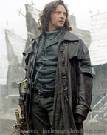|
|
||||
|
|
by Jeffrey Chen  Poor Kate Beckinsale. She's a very good sport when it comes to playing action heroines, but now it appears she'll be doomed to fight vampires and werewolves for the rest of her life. In the particular case of Van Helsing, she also has to do it dressed in some kind of cross between her outfit from Underworld and the Swiss Miss costume. All the while, she's sporting this bad Romanian accent -- already silly enough on its own -- but then her character, Anna Valerious, is forced to say ridiculous lines of urgent obviousness. After she stops Van Helsing (Hugh Jackman) from shooting at a werewolf who was once a beloved comrade, he gets angry and tells her the monster is no longer the person she once knew, and that it will kill people. Cries Anna, "No! He just can't help himself!" This bit of "duh" is just a few steps up from Beckinsale's Pearl Harbor line, "And then all this happened." Anna is stubborn, no-nonsense, and all-business, which is exactly the kind of person you don't want partnering up with a main hero who's also stubborn, no-nonsense, and all-business. Having no dynamic to work with, Jackman and Beckinsale march on and play their characters as if they're not in on the joke, and therein lies Van Helsing's biggest problem. Much of the movie is a joke. However, director Stephen Sommers doesn't commit to it -- part of him thinks the action makes for great drama, so the movie isn't one thing nor the other. So while Jackman, Beckinsale, and Shuler Hensley (as Frankenstein's Monster) are being all serious, Richard Roxburgh (as Dracula), David Wenham (as Van Helsing's sidekick Carl), and Kevin J. O'Connor (as Igor) play tug-of-war for the side of comedy, hamming it up. One can trace this wishy-washiness to Sommers's previous box office hits, The Mummy and The Mummy Returns, both movies I didn't particularly enjoy but could easily see their appeal for others. Both films were lighthearted takes on the old tried-and-true exploration adventures, and Brendan Fraser did his part by being a leading man who was both capable action hero and lovable lug. Why mess with success, right? So Sommers ported this exact same tone over to Van Helsing, complete with the trademark side characters who do nothing but act eccentrically goofy. However, this is much darker material -- primarily night-based, with blood curses replacing Egyptian ones, and a lot more potential for creepiness and even sexual luridness. That light tone also doesn't work well with a hero who doesn't have time to have a sense of humor -- as a more tragic figure, his character fits the darker story but not the tongue-in-cheek treatment. What we get is a movie that can't convince us to buy into it because its need to be silly doesn't fit with its supposedly chilling tale. And that tale wants so much to be dramatic in parts that when it tries, it's too late -- we're already laughing. A major part of the reason we're not convinced comes from the ineptitude with which Sommers handles his leading players. We don't get to know anything about Van Helsing other than he has a past he can't remember. Jackman's lines are mostly expository, and so the hero is boring. And then there's poor Kate. And that accent. And those lines. Rushing into an empty chamber where Dracula's instruments used to be, Anna declares with alarming straightforwardness, "They must have moved the equipment to Drah-culah's cah-stle!" The audience laughed. The Wolfman in human form, played by Will Kemp, howls in pain, his face contorted in agony, and all I can think is, "It's sad to see so much wasted conviction," especially since this is in the same movie where Dracula and his even-worse-Romanian-accented brides just spent a scene screeching at each other in a temper-tantrum session worthy of Mystery Science Theater 3000. Roxburgh, bless his skill at camp, doesn't just chew the scenery, he swallows it whole. But the memo he got about what kind of movie this was to be was probably very different from the one Jackman got, which is why their first scene face-to-face ends up being so awkward, with Jackman looking confused as Roxburgh cackles hysterically. Maybe Sommers stopped paying attention at some point -- his cg-filled action sequences have a similar half-conviction, where people fall from great heights and walk away with barely a scratch. And I think every one of the set pieces ended with people swinging on ropes. If your action scene goes nowhere, just have people swinging on ropes. And crash through windows. And throw in some fire for good measure. I recently watched one of those making-of documentaries on the Indiana Jones movies, and seeing that along with Van Helsing made me realize how truly rare and wonderful a good action picture is. The successful ones have something the audience can connect with, latch onto -- a realism that exists in the core of something that is all about being unreal. That comes with focus and assuredness on the part of the filmmakers. If Van Helsing can't figure out what it wants to be, why should the audience have any investment? The goofy Mummy approach betrays Sommers's own lack of investment in the material -- after all, one of the best ways to mask insecurity is to call attention to oneself through humor. Could Sommers have made an actual thriller with some dark themes and dashes of witty comedy? We'll never know, because that's not what he tried here. (Released by Universal and rated "PG-13" for non-stop creature action, violence, frightening images and sensuality.) Review also posted on www.windowtothemovies.com. |
||
|
© 2026 - ReelTalk Movie Reviews Website designed by Dot Pitch Studios, LLC |



